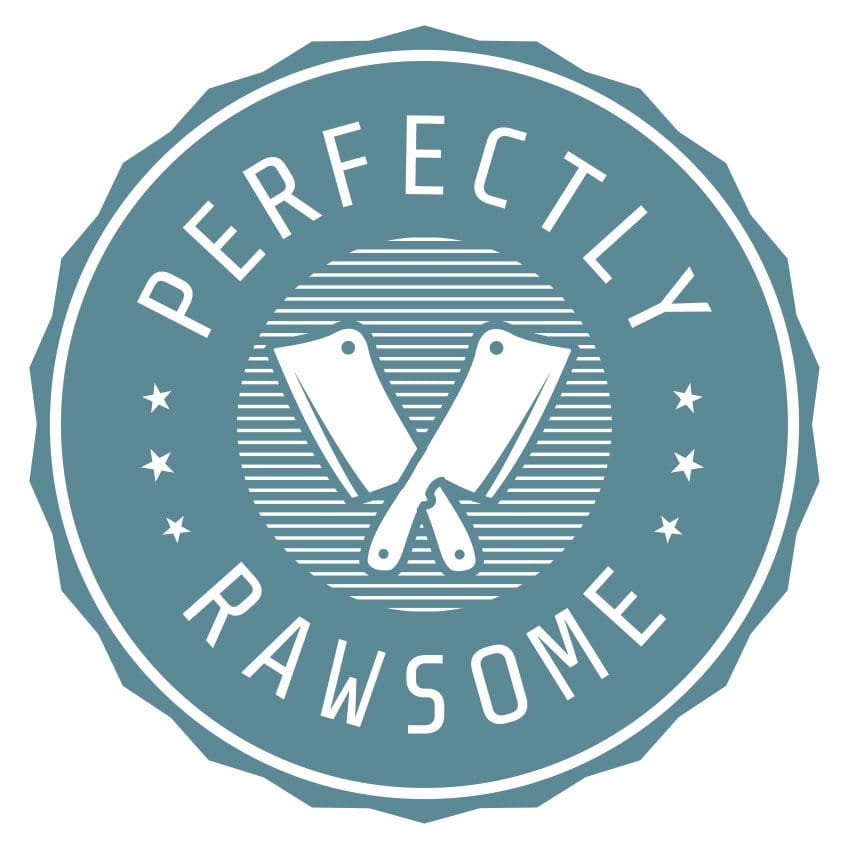Home prepared raw diets for small dogs may seem daunting in the beginning. Many meal photos online showcase meals suitable for medium, large, and giant breeds. However, a do-it-yourself raw diet for a small breed is obtainable with a few adjustments.
The standard guidelines for Prey Model Raw (PMR) and Biologically Appropriate Raw Foods (BARF) still apply to raw diets for small breed adult dogs and developing puppies. Small dogs that weigh 20lbs (9kg) or under at full maturity can eat a home prepared raw diet just like medium, large, and giant breeds. However, it is important to make several adjustments to accommodate a small dog’s needs:
Ingredient Accommodations
Raw Meaty Bones (RMB) and supplement accommodations are necessary to provide options suitable for small breed dogs.
Small Dog Meal Prep
The metric system is the ideal measurement system to complete batch meal preparation and balance over time diets.
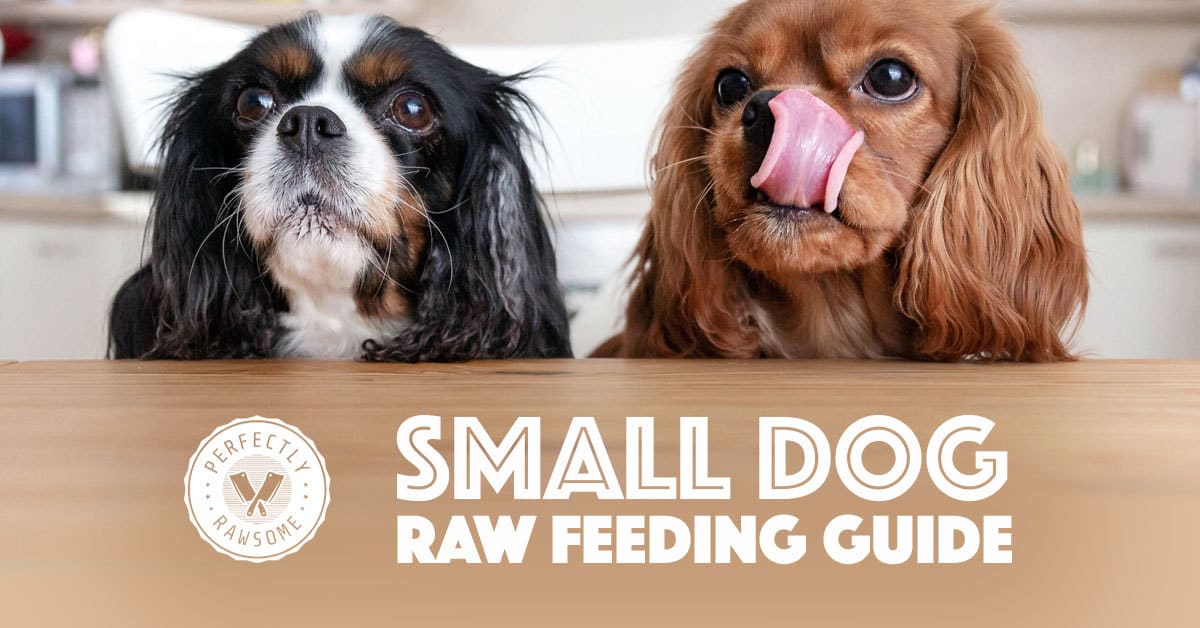
Ingredient Accommodations
Small dogs and puppies can eat home prepared raw diets that consist of whole chunks of muscle meat, raw meaty bones, organs, and whole foods. Their nutritional requirements for essential nutrients are no different than larger dogs. However, raw meaty bones and supplements need to be strategically selected to provide size appropriate options.
Whole Raw Meaty Bones for Small Dogs
Home prepared raw diets for small dogs that use whole raw meaty bones as a source of calcium must include options suitable for the dog’s size. Raw meaty bones from smaller animals are ideal because they provide softer, less dense bones that small dogs are physically able to consume.
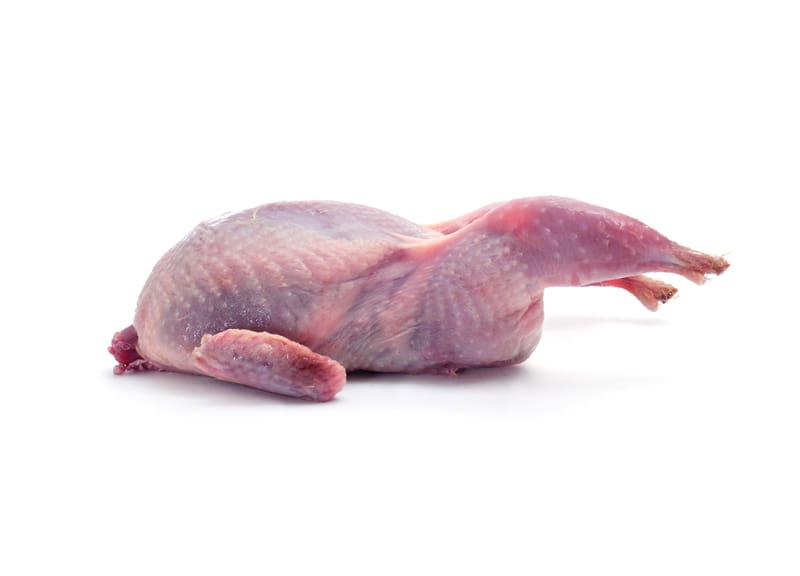
Quail
The amount of meat, edible bone, calories, protein, fat, and carbs are based on 3.5oz (100g).
| Calories | 192 kcal |
| Meat | 90% |
| Edible Bone | 10% |
| Moisture | 69.6% |
| Protein | 19.6% |
| Fat | 12% |
| Carbohydrate | 0% |
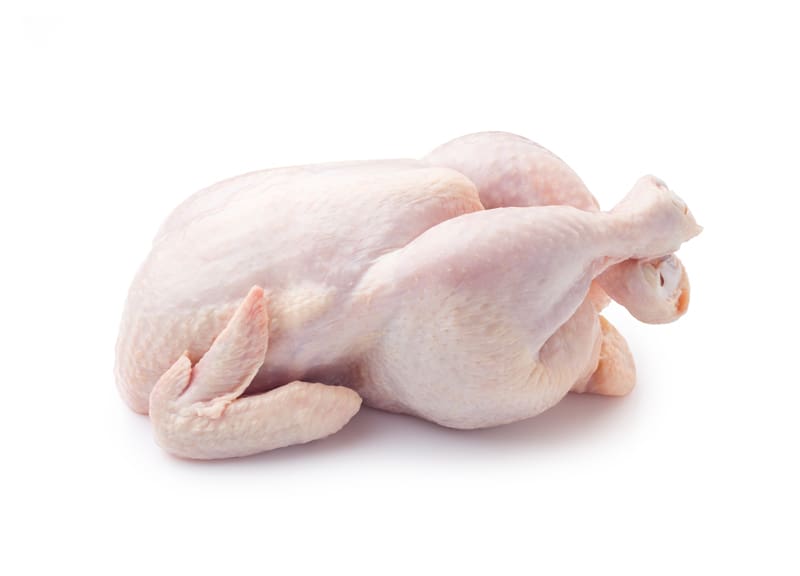
Whole Cornish Hen
The amount of meat, edible bone, calories, protein, fat, and carbs are based on 3.5oz (100g).
| Calories | 200 kcal |
| Meat | 68% |
| Edible Bone | 32% |
| Moisture | 68% |
| Protein | 17% |
| Fat | 14% |
| Carbohydrate | 0% |

Rabbit, Skinless
The amount of meat, edible bone, calories, protein, fat, and carbs are based on 3.5oz (100g).
| Calories | 136 kcal |
| Meat | 72% |
| Edible Bone | 28% |
| Moisture | 73% |
| Protein | 20% |
| Fat | 5.6% |
| Carbohydrate | 0% |
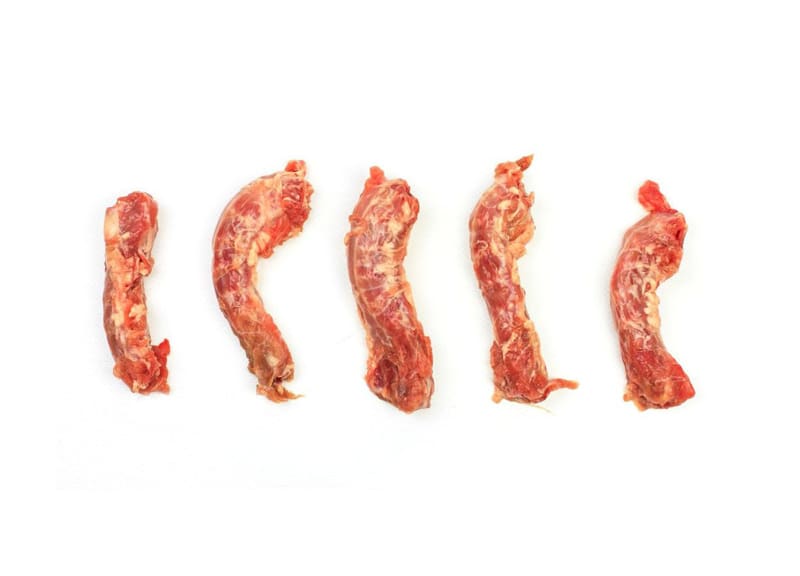
Chicken Neck, Skinless
The amount of meat, edible bone, calories, protein, fat, and carbs are based on 3.5oz (100g).
| Calories | 154 kcal |
| Meat | 60% |
| Edible Bone | 40% |
| Moisture | 71% |
| Protein | 17.6% |
| Fat | 8.8% |
| Carbohydrate | 0% |
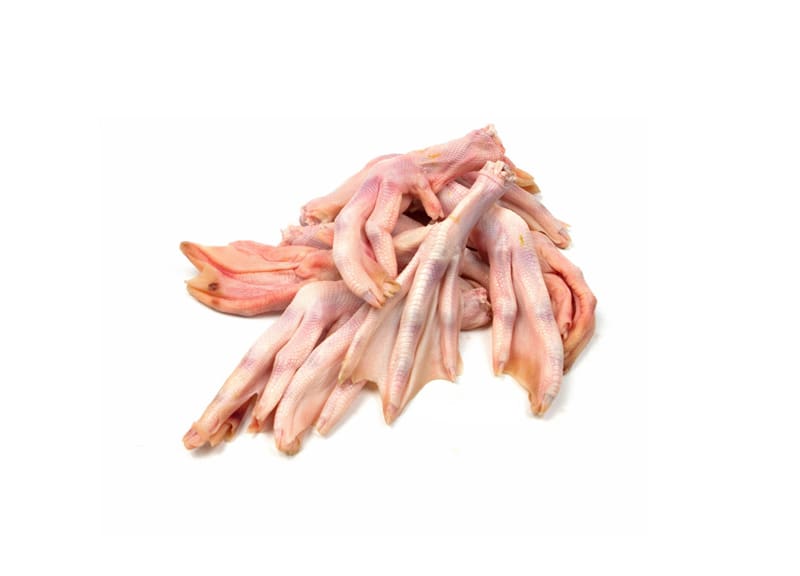
Chicken or Duck Feet
The amount of meat, edible bone, calories, protein, fat, and carbs are based on 3.5oz (100g).
| Calories | 217 kcal |
| Meat | 40% |
| Edible Bone | 60% |
| Moisture | 61.5% |
| Protein | 17.5% |
| Fat | 16% |
| Carbohydrate | 0.03% |
Ground Raw Meaty Bone Considerations
In addition to whole raw meaty bones, ground bones can be used in home prepared raw diets for small dogs. Medium-Large raw meaty bones for bigger dogs can be fed but it is recommended to provide these options in ground form. These bones are often too large to provide whole in a single meal and are too dense for small dogs.
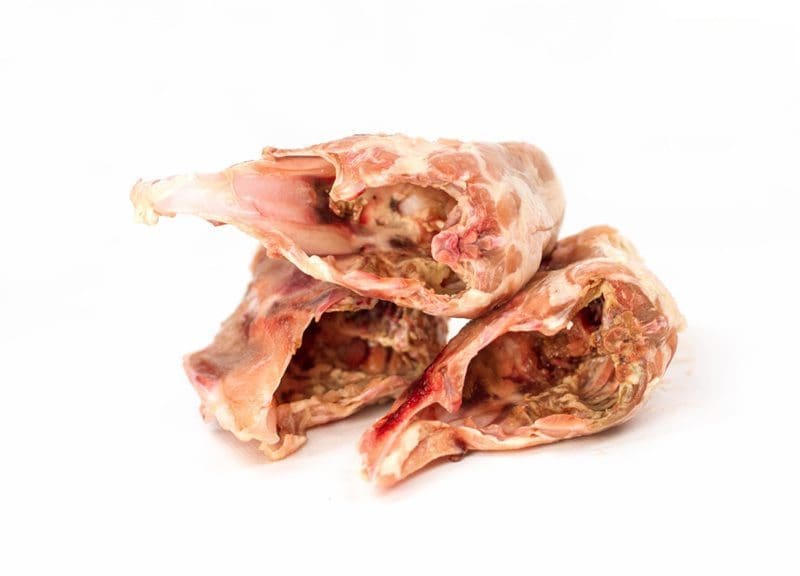
Chicken or Duck Frames
The amount of meat, edible bone, calories, protein, fat, and carbs are based on 3.5oz (100g).
| Calories | 202 kcal |
| Meat | 20% |
| Edible Bone | 80% |
| Moisture | 62% |
| Protein | 18% |
| Fat | 14.5% |
| Carbohydrate | 0.03% |
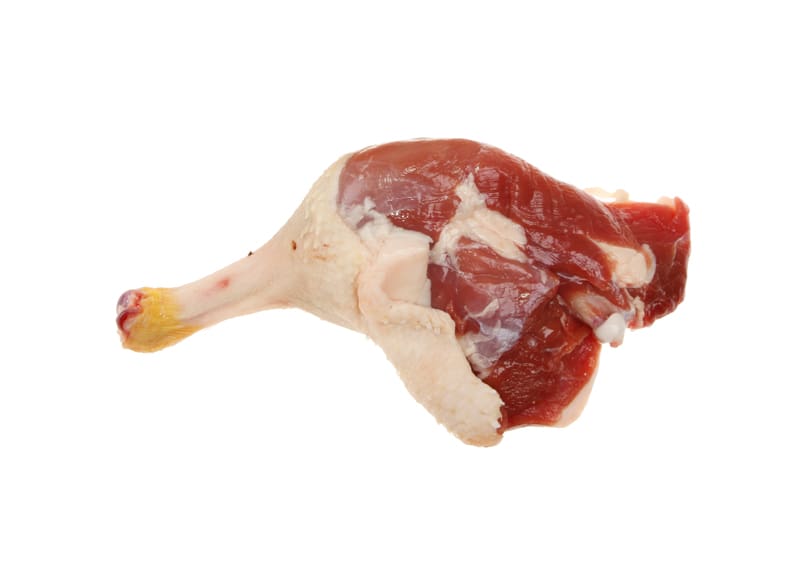
Chicken or Duck Leg Quarters
The amount of meat, edible bone, calories, protein, fat, and carbs are based on 3.5oz (100g).
| Calories | 214 kcal |
| Meat | 70% |
| Edible Bone | 30% |
| Moisture | 67% |
| Protein | 16% |
| Fat | 16% |
| Carbohydrate | 0.17% |
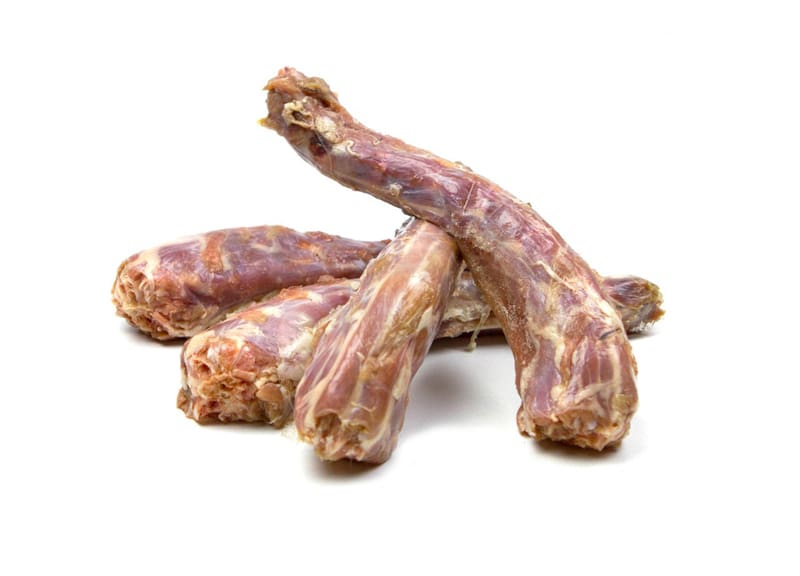
Duck or Turkey Necks
The amount of meat, edible bone, calories, protein, fat, and carbs are based on 3.5oz (100g).
| Calories | 125 kcal |
| Meat | 55% |
| Edible Bone | 45% |
| Moisture | 76% |
| Protein | 16.5% |
| Fat | 6% |
| Carbohydrate | 0% |
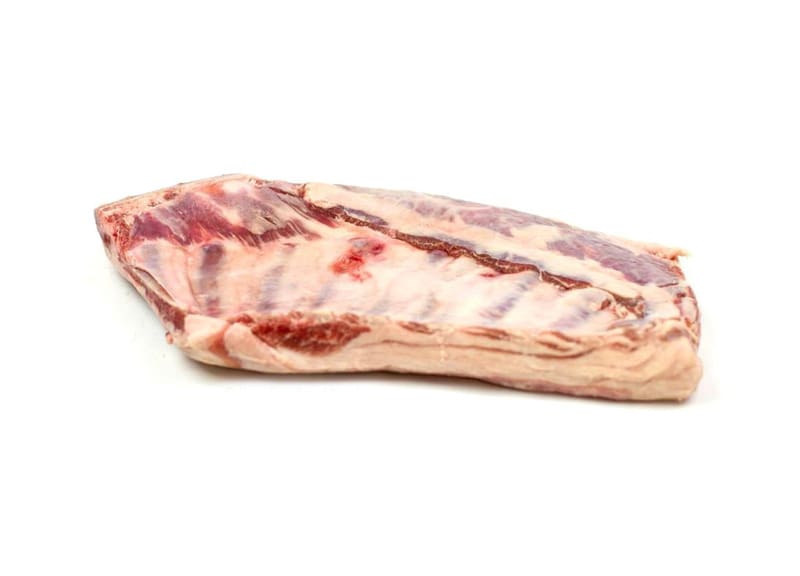
Pork or Lamb Ribs
The amount of meat, edible bone, calories, protein, fat, and carbs are based on 3.5oz (100g).
| Calories | 279 kcal |
| Meat | 70% |
| Edible Bone | 30% |
| Moisture | 56.6% |
| Protein | 21% |
| Fat | 21.5% |
| Carbohydrate | 0% |
Supplements for Small Dogs
Whole foods or targeted supplementation is recommended to fulfill the nutritional deficiencies in ratio raw diets instead of relying upon a multivitamin. However, many single nutrient supplements are often too concentrated for small dogs and make daily dosing difficult.
Therefore, when supplements are utilized instead of whole foods, it is recommended to use liquid nutritional supplements. These will supply essential nutrients to a small dog without cumbersome compressed tablets or gelcaps. Below is a list of brands that provide liquid supplements:
Trace Minerals Research
Provides a range of mineral and vitamin supplements. This brand is recommended for liquid iron, copper, zinc, and manganese supplements.
NOW Foods
Provides a range of supplements in both liquid, tablet, and capsule form. However, this brand is recommended for liquid vitamin D and vitamin E supplements.
Solgar
Provides a range of supplements in both liquid, tablet, and capsule form. Like NOW Foods, Solgar is recommended for liquid vitamin D and vitamin E supplements.
Small Dog Meal Prep
Prepping raw meals for a small dog requires the same steps as meal prepping for a bigger dog; although it is recommended to make small adjustments to the process to make prep easier and more efficient.
Ideal Unit of Measurement
It is recommended to use the metric system when weighing ingredients for a small dog. Grams will be more accurate when prepping small amounts of food. Be sure to purchase a digital kitchen scale sensitive enough for a tenth of a gram.
Balance Over Time
While puppies require daily balance, it is easier to feed small adult dogs a raw diet that achieves “balance over time.” This means that all essential nutrients are provided over the course of several days versus on a daily basis. This approach allows pet parents to feed larger portions of certain ingredients less frequently. Many supplements can also be fed in this way, which makes dosing the more concentrated supplements much easier. This approach does require additional calculations to ensure the diet is providing all essential nutrients within a 7 day time frame.
Batch Meal Prep
It is recommended to prep home prepared raw diets in batch quantities versus individual daily amounts. When following a formulated daily recipe, multiply each daily ingredient by 30 to calculate the quantities needed for each ingredient. Once these calculations are complete, reduce meal prep time by weighing each ingredient's 30 day total rather than weighing daily amounts. Distribute the 30 day total of each ingredient as evenly as possible among daily meal containers.
CLOSING COMMENTS
While small in stature, small dogs still have the same biological needs as their larger counterparts. Small dogs can thrive on raw food as long as special considerations are made.
Raw Meaty Bone Considerations
Be sure to select raw meaty bones from smaller animals when feeding whole raw meaty bones. Ground bones and calcium supplements are an additional option if whole bones are not fed.
Liquid Supplement Alternatives
Targeted supplementation for nutritional deficiencies in raw diets for small dogs can be fulfilled by using brands that provide liquid vitamin and mineral supplements at a lower concentration.
Utilize the Metric System of Measurement
Weighing ingredients in grams provides an easier and more accurate method to measure the quantity of food needed in a small dog’s home prepared diet.
Balance Over Time When Possible
Feeding larger portions of certain ingredients less frequently throughout the week allows for a balance over time approach. This method is only suitable for adult dogs.
These recommendations are the only differences when feeding raw to a small breed in comparison to bigger dogs – otherwise everything else remains the same, just in smaller quantities.
